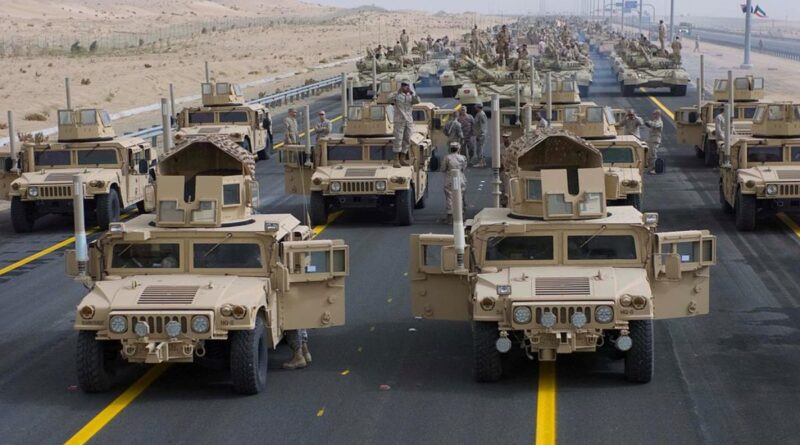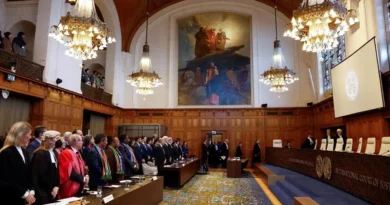The US and UK militaries owe poor countries $110.000 billion in climate offsets for carbon emissions
PASCUAL SERRANO
According to calculations made by the think tanks Common Wealth, a nonprofit organization funded by philanthropic foundations and donations based in the United Kingdom and who also worked in the United States, The social cost of the carbon emissions of the armies of these two countries mentioned is approximately 111.000 billion dollars. Money that is stolen from the finances of the nations most threatened by the climate crisis.
International climate agreements establish that countries, companies or entities that emit greenhouse gases They receive an allocation of emission rights, which represent a certain amount of permitted emissions. These rights can be bought, sold or transferred between the parties participating in the market. If an entity has surplus emissions rights because it has reduced its emissions, it can sell those surpluses to other entities that need more rights to meet their emissions reduction goals..
It is evident that it is the poorest countries that, due to their little industrialization and consumption, have surplus emissions rights to sell; and that it is the rich who, by polluting more and needing more emission rights, pay the poor to be able to pollute what the latter do not do. Well, this calculation has not included the 430 million tons of CO₂ that the UK and US militaries have emitted since the Paris Climate Agreement came into force in 2016. That represents more than total greenhouse gas emissions produced in the UK in 2022.
Let us not forget that emissions from military sources are not addressed in international climate agreements. As a result of American lobbying, overseas military broadcasts were exempted from the 1997 Kyoto Protocol and the Reporting on military emissions remained voluntary in the 2015 Paris Climate Agreement.
The rights to emit those millions of tons of CO₂, according to the Common Wealth study, are estimated at 110.000 billion dollars, 106.000 billion attributable to US emissions and 5.000 billion to emissions from the United Kingdom. Money that these two countries never paid.
The organization thus denounces that "the presence of the US and the United Kingdom abroad shows the various ways through which military bases, their activity and their infrastructure produce environmental damage and toxic waste."
Not only that, “the UK and US militaries have their own international military industry to supply equipment and services. In both countries, this industry is a beneficiary of public investment and many state decisions. For example, in the US, the Department of Defense budget approved last December in the Senate was 886.000 billion dollars. ANDUS defense spending represents almost 40% of the military expenditures of countries around the world, according to figures from the Stockholm International Peace Research Institute (SIPRI) referring to 2022. In fact, Washington spends more on defense than the next 10 countries combined.
Since 2001, the US Department of Defense has accounted for between 77% and 80% of the US government's total energy consumption, while the UK Ministry of Defense accounts for at least 40% of the US government's emissions. British public sector.
Conmon Wealth recalls that “the military-focused industrial strategies of both the US and the UK have been benefited from state intervention, while the green sectors have suffered a lack of support.”
The costs of military pollution and environmental damage are being suffered most intensely in countries of the Global South, which are facing the diffuse, but increasingly intense, effects of global warming. According to the recommendations of the Anglo-Saxon study, “as an initial step to correct their historical and current contribution to the ecological crisis, the US and the United Kingdom should contribute, along with other large CO₂ emitters, with the necessary funds to compensate the countries of the South. that face the climate crisis and the scarcity of contributions from the polluting countries of the North.”
“Reduce the US and UK global footprint of nearly 900 military bases and introduce a military super fund, similar to that administered by the US Environmental Protection Agency, to pay for environmental rehabilitation of communities affected by hazardous materials, Pollution and waste from military bases and infrastructure are some of the measures necessary to correct the entire spectrum of environmental impacts,” adds the Foundation.
In a 2019 study, the Brown University (USA) estimated that since the invasion of Afghanistan in 2001, the United States military had emitted 1.212 million tons of greenhouse gases, with an annual average greater than that of many industrialized countries such as Sweden, Norway or Switzerland.
Other report from the British universities of Durham and Lancaster concluded that the US military is “one of the biggest polluters in history” and stated that, if it were a country, it would be the 47th largest emitter of greenhouse gases, taking into account only emissions from fuel use.
If the drama of the deaths and destruction of wars were not a sufficient reason to renounce the armies and demand lower military spending, we now observe the contamination of their industry and the mechanisms of the great powers to avoid the financial responsibilities established in global environmental agreements.












